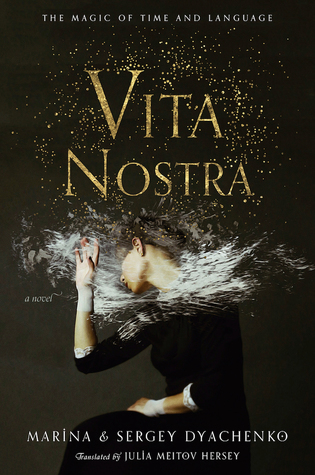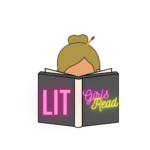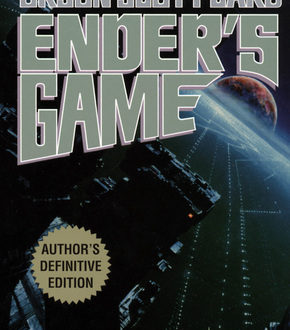
Vita Nostra
Author: Marina and Sergey Dyachenko, Julia Meitov Hersey (Translator)
Edition: Kindle
Date read: October 6, 2020
Goodreads Synopsis:
While vacationing at the beach with her mother, Sasha Samokhina meets the mysterious Farit Kozhennikov under the most peculiar circumstances. The teenage girl is powerless to refuse when this strange and unusual man with an air of the sinister directs her to perform a task with potentially scandalous consequences. He rewards her effort with a strange golden coin.
As the days progress, Sasha carries out other acts for which she receives more coins from Kozhennikov. As summer ends, her domineering mentor directs her to move to a remote village and use her gold to enter the Institute of Special Technologies. Though she does not want to go to this unknown town or school, she also feels it’s the only place she should be. Against her mother’s wishes, Sasha leaves behind all that is familiar and begins her education.
As she quickly discovers, the institute’s “special technologies” are unlike anything she has ever encountered. The books are impossible to read, the lessons obscure to the point of maddening, and the work refuses memorization. Using terror and coercion to keep the students in line, the school does not punish them for their transgressions and failures; instead, their families pay a terrible price. Yet despite her fear, Sasha undergoes changes that defy the dictates of matter and time; experiences which are nothing she has ever dreamed of . . . and suddenly all she could ever want.
A complex blend of adventure, magic, science, and philosophy that probes the mysteries of existence, filtered through a distinct Russian sensibility, this astonishing work of speculative fiction—brilliantly translated by Julia Meitov Hersey—is reminiscent of modern classics such as Lev Grossman’s The Magicians, Max Barry’s Lexicon, and Katherine Arden’s The Bear and the Nightingale, but will transport them to a place far beyond those fantastical worlds(Goodreads).
Should Lit Girls read it?
Honestly, I’m not sure. It has been a few weeks since I finished Vita Nostra and I still don’t know what to make of it. It was offbeat and magical in a hard, realistic way. So if that’s your thing, then go for it. If you need closure, and a solid ending to feel satisfied by your reading efforts, then skip it.
Lit Girls Take
Where to begin with Vita Nostra? I’m going to attempt to give you the best review I can. It’s going to be a bumpy road, so stick with me. Vita Nostra is an English translated Russian novel. However, I don’t believe that is where my confusion and hesitancy comes in. The translation was, from my non-Russian speaking point of view, flawless. I didn’t read any idioms or English quirks as being out of place. The language flowed exactly as you would expect it to. Therefore it was the story itself that lost me.
Sasha is admitted to, or rather is forced to attend, the Institute of Special Technologies (Vita nostra being their school song) in the small town of Torpa. Should she not, terrible things will befall her family and friends, so the concept of acceptance is just an illusion. There, strange professors force her to memorize gibberish paragraphs and complicated mental exercises. It was not clear to me exactly what was happening, as I would not be accepted at this school. The tasks become increasingly more intense and Sasha is the breakout student. When her boyfriend Kostya fails his final and his grandmother dies, it becomes clear to all of them what is at stake if they don’t succeed.
We continue to follow Sasha through three years at the Institute, where these mental exercises begin to have a physical effect on her body, allow her to morph into what I think was a cyborg type creature and eventually grow wings and fly (in my mind she looked like Angelina Jolie’s Maleficent). As the work becomes more intense, the stakes for success for Sasha become higher. This is where I connected back to the story. While I never attended a school that threatened my family, the stress we can put on ourselves to succeed is only too real. Often that is exactly the thing that stands in our way. This characterization of Sasha was familiar and well flushed out. She was insecure, and skeptical, and strong, and smart all at the same time. She felt like a real person, even if I had no idea what was happening to her.
This was the part that I was most able to understand. The characters, even those who turned out not to be human (I couldn’t explain it if I tried) had their own personalities and quirks and were relatable, to a degree. The other students too, had their own stories, though we only get to know a few of them. They all struggle and succeed or fail, and Sasha rides that wave with them. She is empathetic even when she doesn’t want to be, but she is self-aware enough to recognize when the work has changed her.
By the end of the novel what is clear, is that none of these characters are truly human. They are Words. And if you would like me to explain to you what that means, I can’t. Perhaps the notion was too cerebral for me, but to the best of my understanding, they are god-like creatures who can manipulate time and space, and create and destroy. Create and destroy what you ask? That is a great question that I would like the answer to as well. The best answer I can posit is “whole worlds”. So there’s that. They do find out specifically what kind of words they are (nouns, pronouns, etc.), as the differences are important. I’ll leave a little bit of mystery for you to discover on your own.
I’m also not going to tell you how Vita Nostra ends, because I’m still figuring it out. It seems to be purposefully ambiguous, which bothers me. I don’t have to like the ending, but I like there to be an ending. While I’m sure there is some greater social commentary or existential enlightenment that comes from this story, I sadly didn’t find it. Much of this book was over my head, and yet it was not unenjoyable.
I was with Sasha the whole way, trying to figure out what was going on with her and sometimes I felt as though the story affected me as well. I would read before bed and slip into a strong state of relaxation where I almost felt as though I was losing my human form. This freaked me out but in a way that made me appreciate the power of quality writing and the transformative nature of words. Perhaps that was the true meaning of this book, I may never know. If ambiguity and existentialism are your kind-of-thing then give it a read, and please explain it to me!





